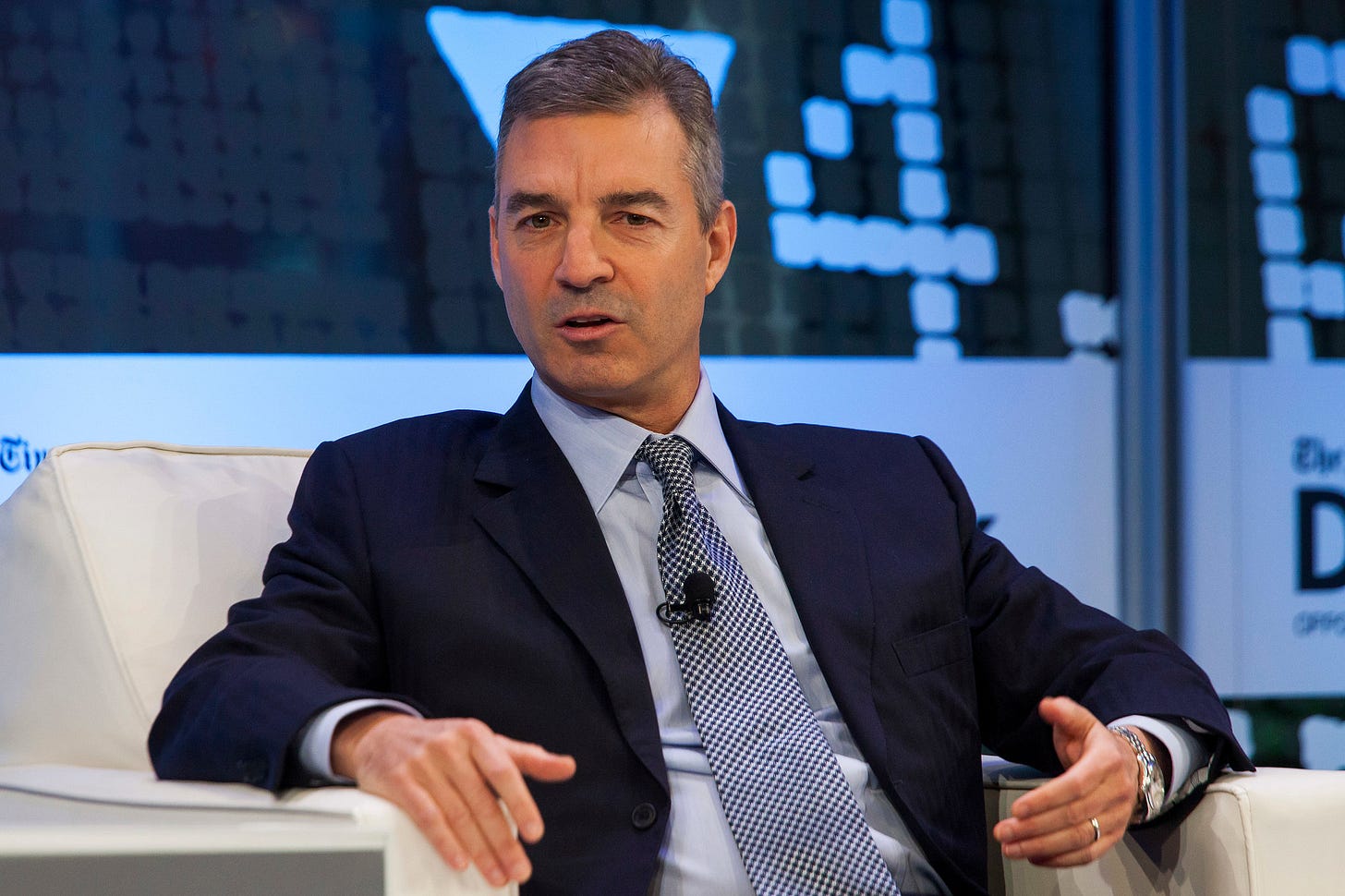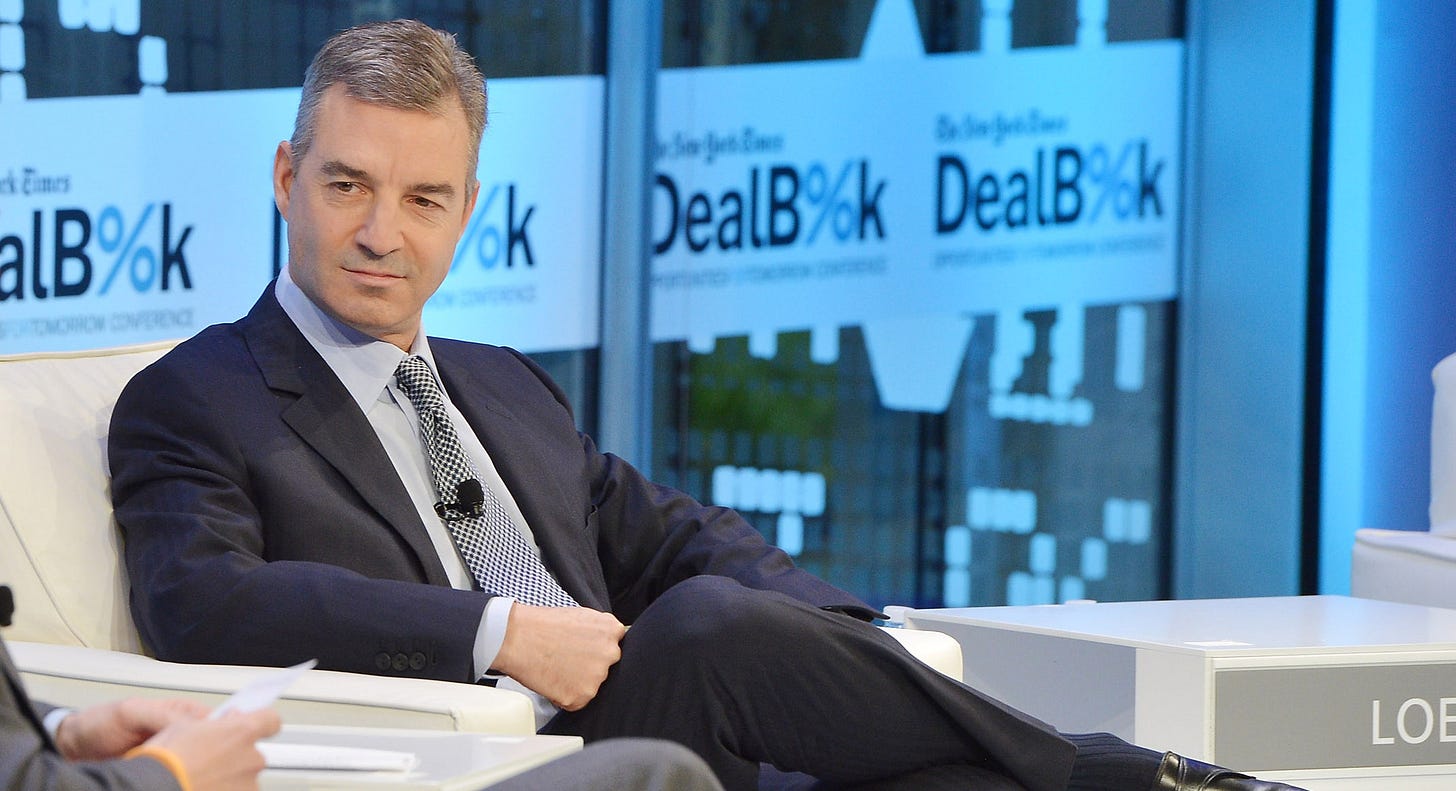“In Investing, Be Quick But Don't Hurry”
We run through the rise of a hedge fund billionaire that made his money from activist investing.
Back to our Sunday Investor pieces. This week we take a look at activist hedge fund manager Daniel Loeb, who founded Third Point. With a current net worth of $3.3bn, he has clearly performed very well. His investment strategy is defined as “opportunistic investing in equities, corporate and structured credit, and venture capital.”
We take a look into how he grew his fund out from scratch, some of his best trades along the way and some of the best bits of advice he’s given over the years.
Who is he?
Daniel Loeb was born on December 18, 1961, in Santa Monica, California.
Loeb attended the University of California, Berkeley, where he pursued a degree in economics. After completing his undergraduate studies, Loeb went on to earn his Master of Business Administration (MBA) from Columbia Business School.
Following his graduation from Columbia, Loeb embarked on his career in finance, initially working as an analyst at Warburg Pincus, a leading global private equity firm.
In 1995, Loeb founded Third Point LLC, his own hedge fund based in New York City. Third Point quickly gained a reputation for its aggressive investment strategies and Loeb's outspoken advocacy for shareholder activism.
Over the years, Loeb’s shrewd trades have swelled inflows, with the fund now managing over $12bn. He has (and still is) incredibly hands on with managing the fund. Despite briefly enlisting a co-chief investment officer in 2019, he took back the role of sole CIO in 2020.
Beyond his work in finance, Loeb is also a noted philanthropist, supporting various causes related to education, healthcare, and the arts. His foundation supports Alzheimer's research, education reform and LGBT rights.
At the start of the month we dropped our Q1 portfolio review. We returned 10.74% on capital invested, beating our benchmark by 5.48%. To see what we bought and sold (along with our current holdings), you can subscribe here:
Some of his best trades
We highlight three of Loeb’s best investments over the years, all revolving around his activist thinking:
Yahoo!
One of Loeb's most celebrated investments was his stake in Yahoo! Inc. In 2011, Loeb initiated an activist campaign against Yahoo's management, criticizing their strategic missteps and advocating for changes to unlock shareholder value.
Loeb's pressure ultimately led to the ousting of the CEO Scott Thompson and several board members. Interestingly, one of the factors that was the nail in the coffin was when it was disclosed that the CEO lied about receiving a computer science degree.
As part of the settlement, Loeb gained seats on Yahoo's board and played a key role in selecting Marissa Mayer (from Google) as the new CEO. Under Mayer's leadership, Yahoo's stock price surged, and Loeb successfully monetized Third Point's stake for an estimated $1bn profit. According to a Forbes article:
“Loeb’s average costs basis for his entire stake in Yahoo is about $13.50 a share. Yahoo is repurchasing Loeb’s stock for $29.11 a share, the closing price of Yahoo’s stock on Friday, meaning the stock has returned 124% since Loeb has been involved in the stock.”
Sony
In 2013, Third Point disclosed a significant stake in Sony and called for the company to spin off its entertainment division, which included its film and music businesses. In May of that year, he revealed a large 7% stake, making him the largest shareholder outside of Japan.
Loeb argued that separating the entertainment assets from Sony's struggling electronics business would unlock shareholder value. While Sony initially resisted Loeb's proposal, the company eventually announced plans to partially spin off its entertainment division in 2014, a move that was well-received by investors.
Even though he only netted a 20% profit from the move, it’s still regarded as one of his best trades due to being able to pressure such a large corporation into making changes. It’s also flagged up due to the guts needed to take such a large stake and have such a conviction.
Baxter International
During 2015, Loeb revealed a stake in Baxter International, a global healthcare company specializing in medical devices, pharmaceuticals, and biotechnology.
This way another classic case of activist pressure to try and unlock profit via change. Loeb urged Baxter to explore strategic alternatives, including separating its biopharmaceuticals division from its medical products business.
Baxter eventually announced plans to spin off its biopharmaceuticals division into a standalone company named Baxalta Incorporated. Third Point supported the spinoff, believing it would enable both entities to focus on their respective core businesses and unlock shareholder value. The spinoff was completed in 2015.
Loeb actually held his stake via Third Point ?for several years after the sale, trimming profits along the way. For example, back in 2018 he sold around 25% of his stake at a price per share of $68.62, represented a sizable gain from average share price when he purchased most of the stock at around $38.
Quotes to live by
Here are a few of his best quotes that we found:
"I look for situations where I can be right only 60% of the time and still make a fortune."
This quote encapsulates Loeb's approach to investing, which emphasizes asymmetric risk-reward opportunities. Loeb understands that he doesn't need to be right all the time to achieve success in investing. By carefully selecting investments where the potential upside far outweighs the potential downside, he can generate substantial returns even with a relatively modest success rate.
"Hedge funds are like samurai swords. They’re sharp and they could cut your head off if you don’t watch what you’re doing."
His analogy highlights the dual nature of hedge funds. While hedge funds can be powerful tools for generating wealth, they also come with significant risks. Like a samurai sword, hedge funds require skill. Failure to have that can result in severe consequences, both for the investor and for those impacted by the fund's actions.
"Be quick but don't hurry."
This quote, often attributed to legendary basketball coach John Wooden, reflects Loeb's philosophy of decisive yet deliberate action. In the fast-paced world of investing, timing is crucial, but rushing into decisions without careful consideration can lead to costly mistakes. Loeb advocates for decisiveness tempered by prudence, emphasizing the importance of striking the right balance between speed and thoroughness.
"The road to investment success is rarely a one-way street."
This quote serves as a reminder that investing is a journey filled with twists, turns, and occasional setbacks. Markets are dynamic and unpredictable, and successful investors must be adaptable and resilient in the face of adversity. Loeb's words encourage investors to embrace the inevitable ups and downs of the investment process and remain focused on their long-term objectives.






